
BAIF Madhya Pradesh organises calf rally for better livelihood promotion
Mar. 25, 2023

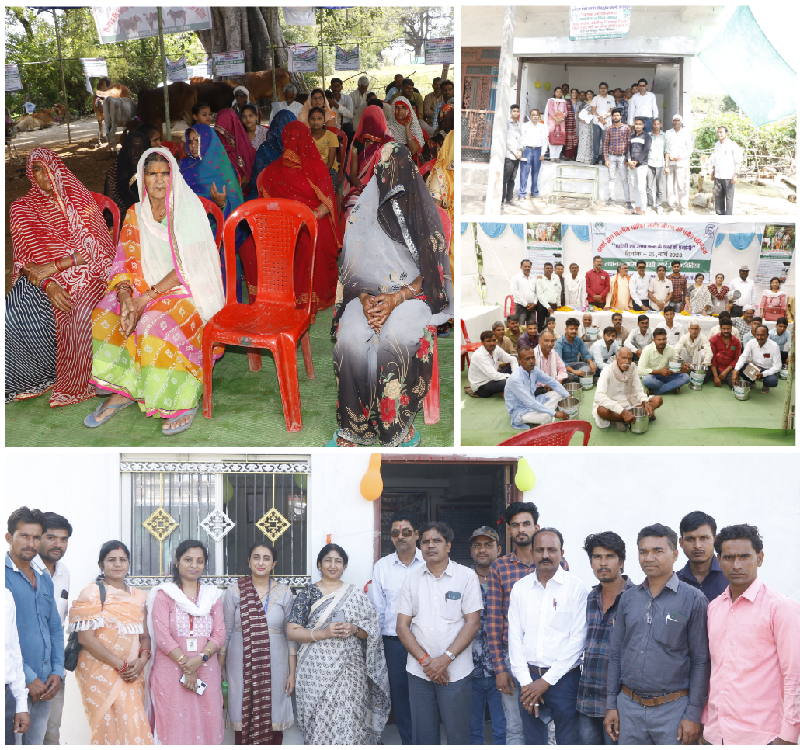

Mar. 25, 2023



Mar. 23, 2023
In alignment with the universally adopted theme “Embrace Equity” for International Women’s Day this year, “Balance for better”, the catchword of the pan-BAIF celebration held on March 23 at its Head Office in Pune, struck a balance between women contributors in the field and women contributors at the community level while providing a glimpse into the lives of a cross-section of empowered women in the development index of BAIF and felicitating them on this occasion.
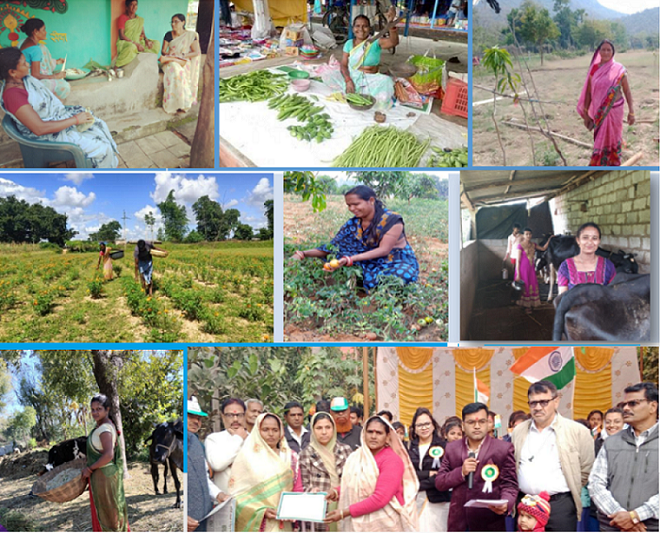
Women Achievers PAN BAIF
Alka Talaade, community leader from Perimili, Gadchiroli, Maharashtra; Basanti Kispotta, adopter of improved vegetable cultivation and provider for her family from Badhunjharia, Sundargarh, Odisha; Manju Devi from Lakrkola, Munger, Bihar; Sangeetha Marathi from Devenahalli, Sirsi, Uttar Kannada, Karnataka, role model; Mallamma from Ragareddypally, Gandeed Mandal, Telangana, organic farming practitioner; Minalben Kodiya from Chandvegan, Valsad, Gujarat entrepreneur and trainer; Sunnibai Machhaliya from Vikas Khand, Jhabua, Madhya Pradesh Kadaknath poultry breed hatchery manager and trainer for women; Sita Oraon from Kundgarhi, Lohardaga, Jharkhand, floriculture cultivator; Prabhati Nayak from Nua-adhapada, Sambalpur, Odisha, community resource person; Naval Kunwar from Badhawa, Neemuch, Madhya Pradesh, energy conservationist; Niruben Bhoya from Arnai, Valsad, Gujarat, mushroom cultivator; Uma Upralae from Silpati, Betul, Madhya Pradesh, master trainer in organic farming; Pushpa Lodha from Moonga Kheda, Chanderiya, Chittorgarh, Rajasthan, adopter of improved package of practices; Annubai Baskel from Bhuradabra, Jhabua, Madhya Pradesh felicitated by Collector, Jhabua district for promoting organic farming through her SHG. Shanti Mishra, Woman Facilitator and Motivator shared the successful adoption of functional literacy skills by women from Bundelkhand region of Uttar Pradesh. On this occasion, bicycles were also distributed to women community functionaries from Lohardaga, Jharkhand for hardship reduction.

Guest Speakers, Ms. Sneha Deokate, Deputy Collector, Pune District, Ms. Shital Pawar, Executive Editor, Sakal Newspapers and Mr. Manish Karnik, CSR Head, Panasonic India, expressed the need for sensitivity to women-related issues, advocacy, community engagement through storytelling and inclusivity while serving as a source of inspiration for urban women. Dr. Rajashree Kashalkar President, Sharada Shakti, Pune, shared their effort in strengthening the role of women in sustainable development.
Dr. Rajashree Joshi, Programme Director, BAIF, reiterated the perception of the Founder, Dr. Manibhai Desai as women being equal partners in development, their social capital worth, involvement in farm, off-farm and non-farm activities; operation of an indigenous cuisine corner – “Nahari”; e-dosts in remote locations; climate action initiatives in Uttarakhand; rehabilitation of widows of Vidarbha region; livestock keepers; custodians of agrobiodiversity resources; Gram Shakti initiative, hygiene of adolescent girls, personal bathing space facility for women in Betul, Madhya Pradesh and presence of 2500 active SHGs reaching out to 30,000 women in BAIF’s locations.
Mr. Bharat Kakade, President, BAIF highlighted the involvement of women in the Livestock, Wadi and Natural Resources Management programmes of BAIF and expressed admiration for “Padma Shri” recipient Hirbai Ibrahim Lobi from the Siddhi community of African origin in Junagadh, Gujarat and a BAIF participant, confidence demonstrated by Jugra Devi from a backward community in Pratapgarh district of Uttar Pradesh many years ago by sharing her experience in promotion of vermicomposting at a national-level meeting in New Delhi, excellent skills demonstrated by women in marking contour lines after being trained in the use of “A” frame and in mango grafting and expansion of BAIF programmes to Tamil Nadu with an outreach of 33 lakh families and women contributing significantly to this growth.
Earlier, Dr. Ashok Pande, Group Vice President, Scientific Research and Livestock Development, Mr. Shrinivas Kulkarni, Group Vice President, Finance and Dr. Alok Juneja, Vice President, Programmes and Livestock Development, BAIF, expressed admiration for the contribution of women to the society in general and rural economy in particular, immense contribution of women to the development programmes of BAIF for more than 50 years, their recognition at the national level and the need for greater participation of women, support from their families and equality in terms of wages and remuneration. Ms. Sujata Kangude, Thematic Programme Executive, Women and Development, BAIF, proposed the vote of thanks. Ms. Suneeta Kuvalekar, Personal Secretary to the President, BAIF, rendered the opening song. Those present on the occasion included senior officials from Panasonic India, Mr. Sujit Gijare, Group Vice President, HR and Administration, BAIF and thematic, administrative, finance and marketing teams from BAIF Head Office.

Mar. 06, 2023
Shri. Giriraj Singh, Hon. Union Minister, Rural Development and Panchayati Raj, Government of India, visited a cactus demonstration site in Wardha, Maharashtra. Spineless cactus as a xerophytic plant, has tremendous potential. However, it has remained unexplored for food, fodder, fuel, fertiliser requirements and even by the fashion industry (5 F plant). For a complete understanding of the economics of cactus cultivation and its benefits to the farmers, cactus-based biogas, bio-fertilizer, bio-energy and vegan-leather made out of cactus, were demonstrated to the Hon. Minister. The demonstration was jointly organised by BAIF, International Center for Agricultural Research in the Dry Areas (ICARDA), CSIR-National Institute for Interdisciplinary Science and Technology (NIIST) and 3 Miracles. BAIF provided 15 tons of spineless cactus from its Central Research Station, Urulikanchan, Pune for this demonstration. Considering the multiple uses, economic, environmental and nutritional benefits of spineless cactus, the Hon. Minister showed keen interest in promoting cactus in dryland areas of India and provided valuable guidance for developing projects with various stakeholders.
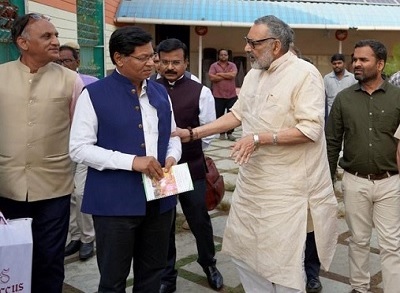
Shri. Bharat Kakade Interacts with Shri. Giriraj Singh
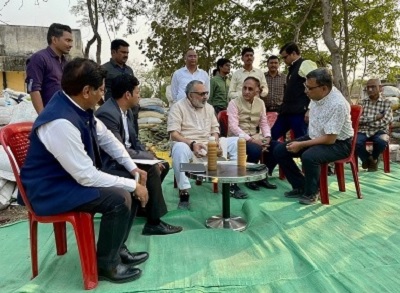
Discussions on economics and benefit of cactus
Mr. Rahul Kardile, District Collector, Wardha, Mr. Rohan Ghuge, CEO, Wardha, Dr. Shiv Kumar Agrawal, Regional Director, ICARDA, Dr. C. Anandharamakrishnan, Director, NIIST, Dr. Hukum Singh Meena, Additional Secretary, Department of Land Resources, Mr. Bharat Kakade, President and Managing Trustee, BAIF, Dr. Vitthal Kauthale, Chief Thematic Programme Executive, BAIF, Mr. Ravi Madan and Streekaya team, Mumbai and Mr. Manish Aswa, Ahmedabad were present during the visit and discussions.
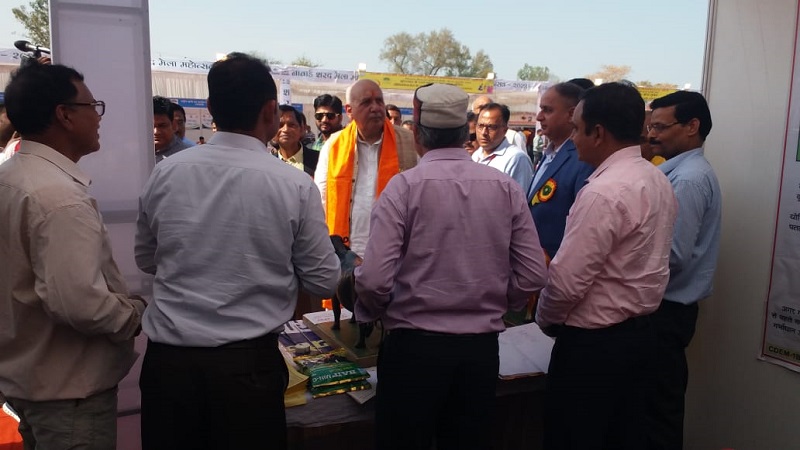
Feb. 26-27, 2023
BAIF Uttar Pradesh participated in the farmers’ fair organised at the Rani Laxmibai Central Agricultural University at Jhansi on February 26-27, 2023. Sri. Surya Pratap Shahi, Cabinet Minister for Agriculture, Agriculture Education and Agriculture Research, Government of Uttar Pradesh accompanied by Sri. Anurag Sharma, Member of Parliament and Dr. Purushottam Sharma, Principal Scientist, Indian Grassland and Fodder Research Institute, Jhansi visited BAIF’s stall and appreciated the BAIF model for improving the livelihood of livestock rearing families in Uttar Pradesh. The stall was also visited by Dr. Ashok Kumar Singh, Vice Chancellor, Rani Laxmibai Central Agricultural University in Jhansi and by the MLA and Chief Development Officer, Jhansi. The dignitaries were briefed about the development programmes launched by BAIF in Bundelkhand region. The stall was visited by a large number of farmers. BAIF stall won the second prize at the fair.



Feb. 26, 2023
The Chondha Gram Panchayat, Community Hall and Girls hostel was formally inaugurated by Shri .Kunvarji Halpati, Hon. Minister of State, Tribal Development, Labour and Employment and Rural Development, Government of Gujarat on in the presence of Dr. K.C. Patel, Member of Parliament, Valsad and Dang constituency, Shri. Arvindbhai Pateil MLA, Dharampur, Shri. Atik Desai, Trustee, LTPCT and Ms. Gayatri Oleti, Operations Head, LTPCT. Approximately 500 villagers from Chondha and surrounding villages were present on this occasion along with staff from LTPCT and Anil Naik Technical Training Centre, Kharel. Community leaders and partner NGOs of LTPCT in Navsari and Dang and BAIF Livelihoods Gujarat, were also felicitated on this occasion. Mr. Jayanti Mori, Joint Programme Director, BAIF and Mr. Abhishek Pandey, Additional Chief Programme Executive, Gujarat were also present on this occasion.
Chondha village in Vansda taluka of Navsari district, is the seat of tribal education. It houses the Dr. Manibhai Desai Navchetan Secondary School established by the Navchetan Manav Vikas Mandir in 2001 with the vision of providing higher education to tribal children especially girls. With the generous support of Larsen and Toubro Public Charitable Trust (LTPCT), a well-equipped laboratory and a residential hostel for 120 tribal girls has been established.
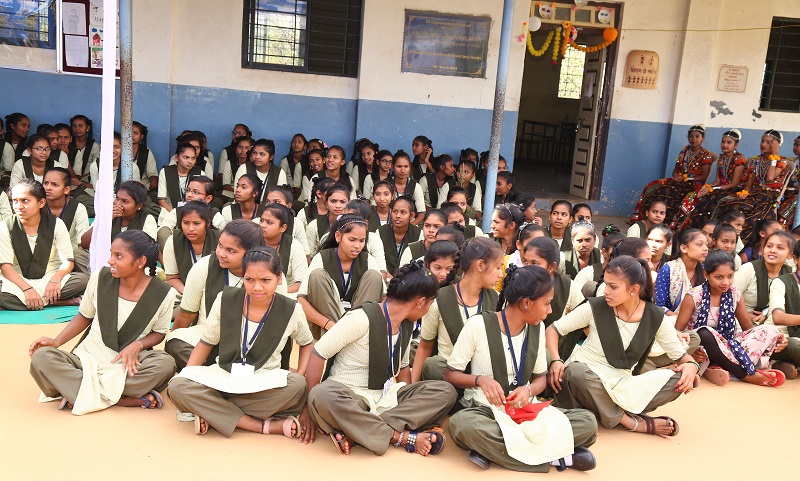
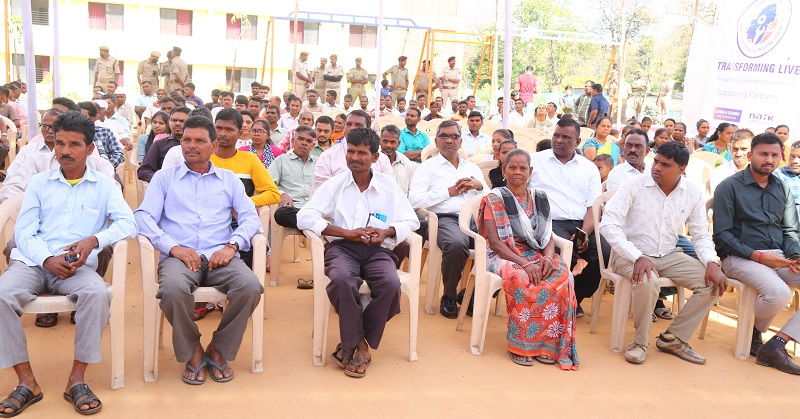

Feb. 26, 2023
Unique, flavoured millet-based food preparations, knowledge session on millet crops and their role in nutrition and food security against the background of climate change, interactions with the tribal farmers and seed-savers were some of the key takeaways for 350 participants at the Pune Millets Festival organised on February 26, 2023 by the Department of Agriculture, ISKCON, Pune and BAIF as a part of the United Nations declared 2023 as the International Year of Millets. The Festival aimed at creating awareness and ushering in the goodness of millets into the palates of the general public. The festival was inaugurated by Mr Vikas Patil, Director – Agriculture, Government of Maharashtra in the presence of Mr. Sanat Kumar Das, Director, Govardhan Rural Development (Govardhan Eco Village) and Mr. Pramod Takawale, Programme Director, BAIF.


Mr. Sanjay Patil, Chief Thematic Programme Executive, BAIF, introduced the participants to BAIF’s work on Millet diversity in Maharashtra, its role in promotion and conservation of millets through community-led initiatives, traditional knowledge of tribal communities and research and extension activity undertaken in tribal clusters of Maharashtra. Grassroot millet conservators from various tribal clusters were felicitated on this occasion. Nutritional qualities of millets were discussed by Dr. Archana Thombre, Medical Officer, YASHADA while Ms. Meghna Shukla, renowned recipe writer, demonstrated simple but delectable millet-based recipes. Such festivals with collaborative effort will facilitate efforts to take millet diversity to the masses and in turn, ensure its conservation and value.

Feb. 25, 2023
BAIF Madhya Pradesh, is implementing the Resilient and Sustainable Agriculture Development Programme in partnership with Grasim Industries in Ujjain district of Madhya Pradesh. BAIF is also implementing the Gramsamruddhi Programme in partnership with NAYARA in Jamnagar and Dev Bhoomi Dwarka districts of Gujarat. These two programmes were announced 1st Runner Up and 2nd Runner Up at The CSR Journal Excellence Awards 2022 in the category of Agriculture and Rural Development. The awards were presented to BAIF and its CSR partners at the hands of Shri. Eknath Shinde, Hon. Chief Minister of Maharashtra at an award ceremony held in Mumbai.
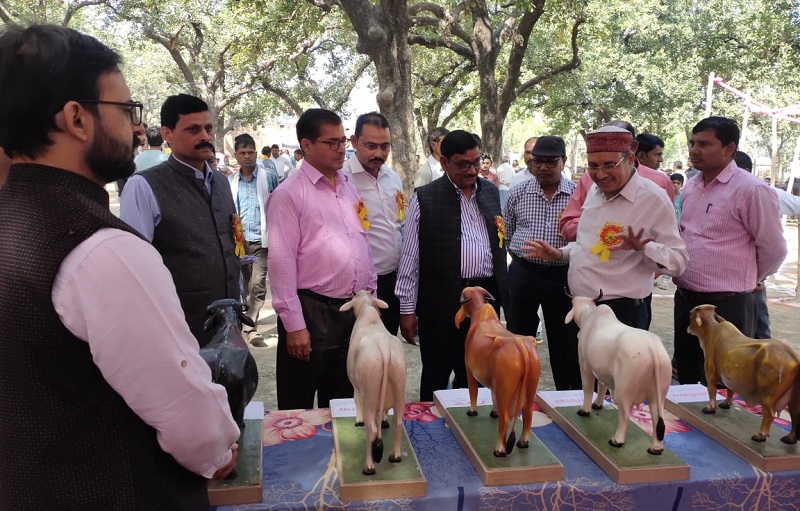
Feb. 24, 2023
With a view to encourage dairy farmers in Bundelkhand region to raise milch breeds for better milk yield and profitability, BAIF organised a calf rally and competition of milking animals at Naadin Kurmiyan village in Chitrakoot district of Uttar Pradesh. The events received a very encouraging response from farmers from surrounding villages and more than 100 dairy animals participated in the calf rally and milking competition event. The animals bred with BAIF-facilitated Artificial Insemination (AI) technique, underwent a milking recording assessment based on the evaluation conducted by a milk recording committee comprising of senior state dairy officials from Chitrakoot district. During this evaluation, a Sahiwal breed recorded 9 litres of milk in one milking time. This impressive record which has been brought about by BAIF effort, was appreciated by all the farmers and district officials present on the occasion and expressed that such was the impact of this programme, that a milk yield of 17-18 litres a day was also possible from improved dairy animals bred by farmers in Bundelkhand region. They encouraged the dairy farmers to rear such improved breeds with better milk yield and income prospects. The programme was organised with the good support of Additional Director, Deputy Director and other senior district-level Animal Husbandry and Dairy Development officials.
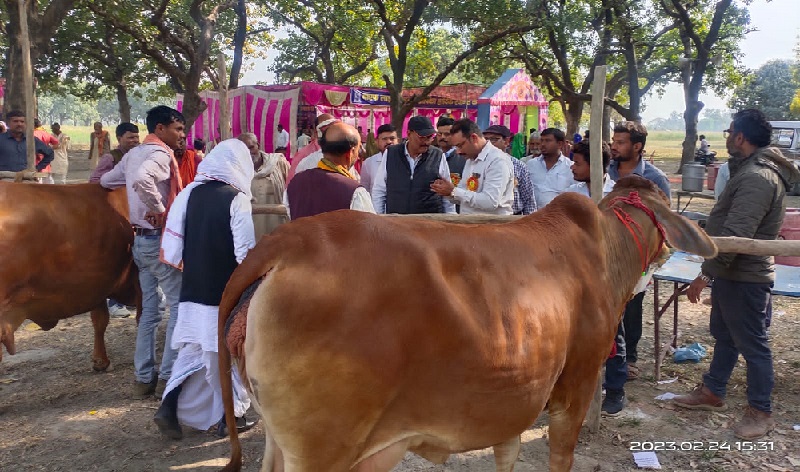
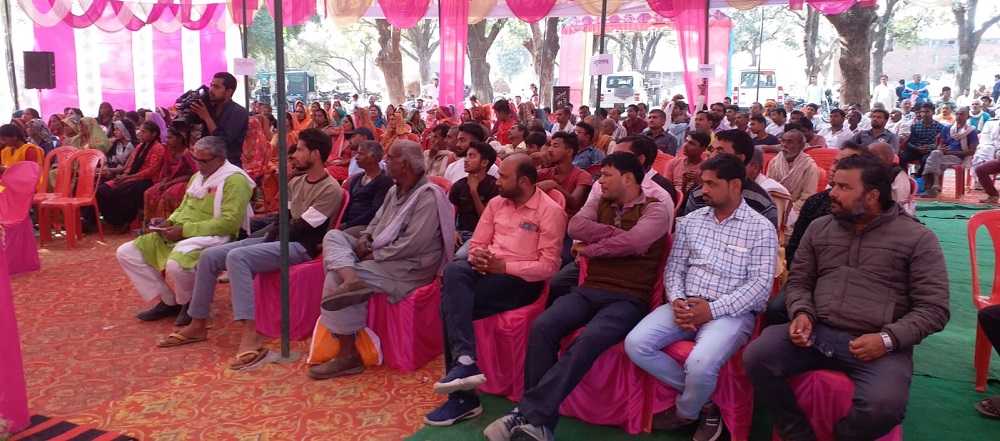
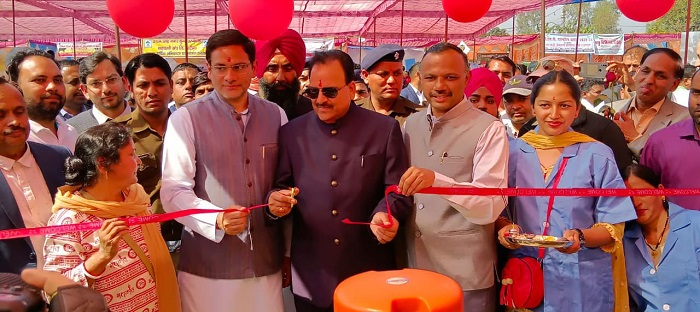
Feb. 23, 2023
The Integrated Livestock Development Programme for Hill Areas in Uttarakhand across 11 districts was launched in the presence of Shri. Ajay Bhatt, Hon. Minister of State for Defence and Tourism, Government of India, Shri. Saurabh Bahugana, Hon. Animal Husbandry Minister, Government of Uttarakhand, Dr. Prem Kumar, Director, Animal Husbandry Department and Dr. Rakesh Singh Negi, CEO, Uttarakhand Livestock Development Board (ULDB) at an awareness camp organized by ULDB under the National Livestock Mission at Sitarganj, Udham Singh Nagar district of Uttarakhand. BAIF demonstrated a live model of Integrated Livestock Development Centre which was appreciated by the dignitaries.

On this occasion, 62 Livestock Development Centres were flagged off digitally by Shri. Saurabh Bahuguna and green flags were waved to the Artificial Insemination (AI) Technicians who will be In-Charge of these centres. Dr. Raviraj Jadhav, Regional Director – BAIF-North, briefed the dignitaries about BAIF’s activities in Uttarakhand state and highlighted the invitation and overwhelming support which had been received by our Founder Dr. Manibhai Desai, from Shri. Hemwati Nandan Bahuguna, Hon’ble Chief Minister of Uttar Pradesh which had been instrumental in the launch of the Integrated Rural Development Programme of BAIF in Uttar Pradesh.

Feb. 07, 2023
BAIF Pune Head Office organised a Blood Donation drive in association with Janakalyan Blood Bank with the active participation of 109 volunteers from BAIF staff at the head office coming forward to donate blood of which, 83 qualified for donating blood for saving precious lives.

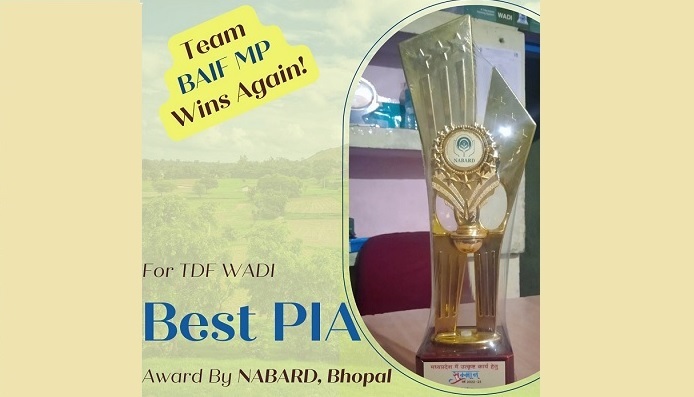
Feb. 04, 2023
For the third consecutive year, BAIF Livelihoods, Madhya Pradesh, received the “Best Project Implementation Agency (PIA) Award for successful implementation of the tribal development (wadi) programme being implemented in 36 villages of Satna district of Madhya Pradesh under the NABARD-funded Tribal Development Fund (TDF). The award instituted by NABARD Regional Office, Bhopal, has been awarded to BAIF for the years 2020, 2021 and 2022 respectively.

Jan 28, 2023
Outstanding Artificial Insemination Technicians (AITs) and Dairy farmers associated with the dairy development programme of BAIF across Maharashtra were felicitated by BAIF Maharashtra, in Osmanabad (Dharashiv). AITs from Osmanabad, Latur, Solapur and Parbhani districts were evaluated based on the number of AIs performed, updation of the MKrishi application, number of calves born and other data reporting parameters. Dairy farmers taking regular services from BAIF and having land holdings less than three acres, were evaluated for the Best Farmer Award based on improved income generation and farm management practices followed. The Best AI Technician Award as well as the HDFC Project “100 Sorted Semen AI” Award was received by Mr. Maruti Kudale, Parada, Osmanabad district. The Best BAIF Sustainable Model (BSM) AI Technician award was won by Mr. Ajit Katkar. The Best Farmer Award was given to Mr. Jalindar Dete from Rui village in Osmanabad district. 8 other AI Technicians and 3 other Dairy farmers were awarded second and third prizes in these categories. The award recipients were felicitated with cash and gift prizes, certificates and plaques. 106 AITs and 10 dairy farmers along with their families and 30 women farmers participated in this memorable event. Dr. Nishikant Bhangale, Associate Thematic Programme Executive, Mr. Mahesh Narode, Regional In-charge, Dr. Santosh Ekshinde, Senior Project Officer and other team members from BAIF Maharashtra contributed to the success of this function.

Dr. Vikas Gapat, M. D. (Ayurveda), Dr. Mukund Taware, Livestock Development Officer, Osmanabad district and Mr. V. B. Dyasa, Regional Director, BAIF Livelihoods – West were the Chief Guests at the function. Dr. Taware provided valuable information about government schemes for the benefit of dairy farmers and urged farmers to take benefit of these schemes. Dr. Gapat shared tips for leading a healthy lifestyle. Mr. Dyasa elaborated on the aims and objectives of BAIF and the important role of the dairy sector in bringing about rural development and poverty alleviation.